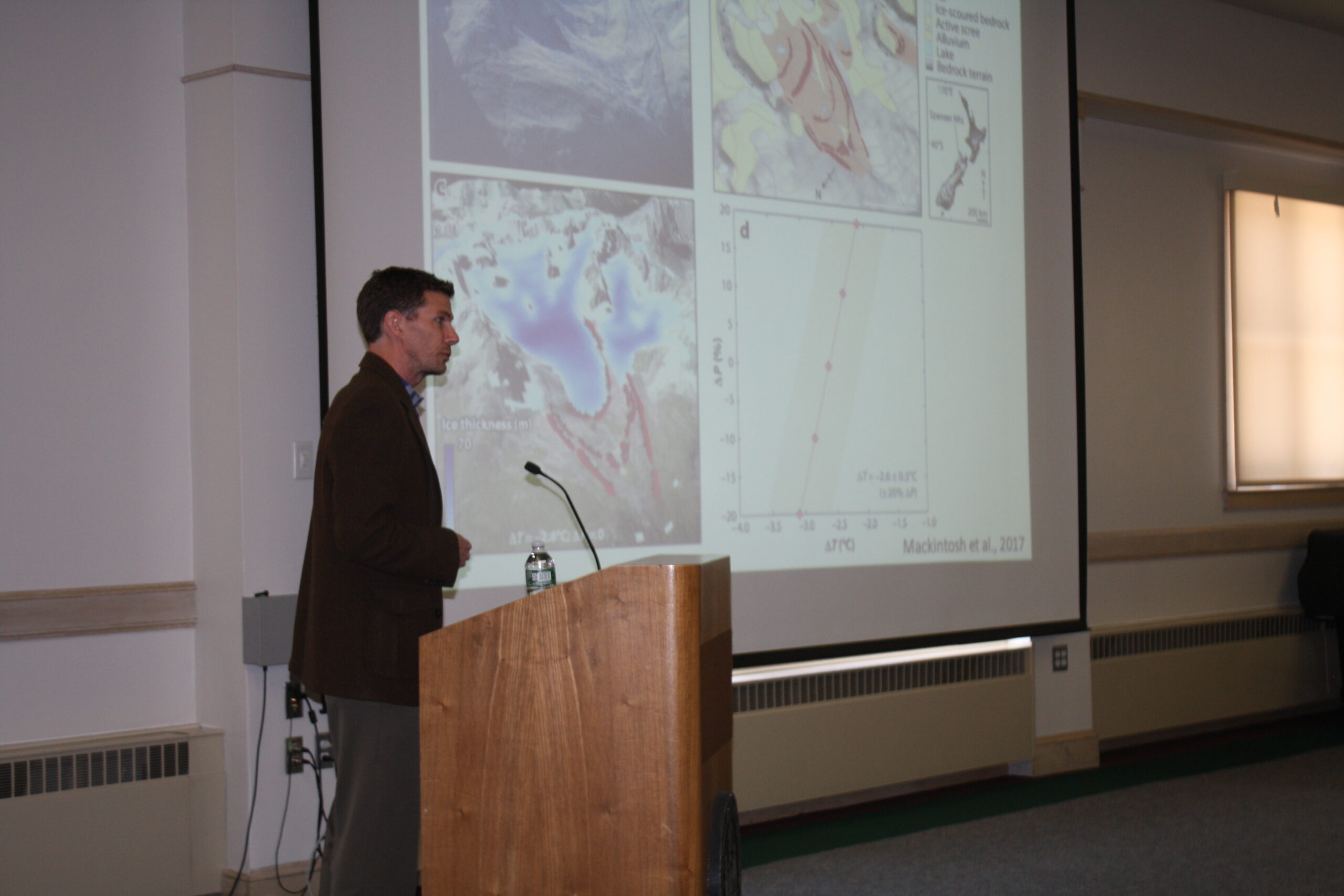
PRESQUE ISLE, Maine — While studying glacial movement at two opposite ends of the globe, Aaron Putnam, the George H. Denton Assistant Professor at the University of Maine’s Climate Change Institute in Orono, and his colleagues have found that major changes in the Earth’s climate 18,000 years ago do not seem much different than the changes that scientists say today have warmed the surface of the Earth at unprecedented rates.
Putnam, a native of Chapman, spoke about research he and other climate scientists have performed on mountain glaciers during a presentation for the Geological Society of Maine’s annual spring meeting at the University of Maine at Presque Isle on April 5. Their 15 years of research began at the Southern Alps in Rakaia Valley, New Zealand, with the intention of figuring out how and why glacial moraines — accumulations of glacial debris — have retreated since the beginning of the last ice age.
“Any unifying theory of climate dynamics requires us to answer those questions,” Putnam said.
In New Zealand, Putnam and colleagues George Denton and Joerg Schaefer used a technique known as cosmogenic surface-exposure dating to estimate the year and time era in which the moraines formed and arrived at their current location. They found that the last of the glacial moraines in the retreated the entire length of the valley up until around 18,000 to 19,000 years ago.
When Putnam and his colleagues traveled to Asian countries, such as Mongolia, western China and Bhutan, and the Patagonian Andes in South America, they discovered that all the glacial moraines in those regions were similarly dated to at least 18,000 years ago, the time frame that began to bring the Earth out of the last ice age.
“The outcomes suggest that an extraordinary warming jolted the Earth out of the ice age and took place over the course of only a millennium or two. This challenges traditional climate models that say the slow change in the Earth’s orbit around that time ended the ice age,” Putnam said.
In addition, the group used the GFDL Earth System Model developed by Joellen Russell, an associate professor of biogeochemical dynamics at the University of Arizona, to determine that when westerly winds shift north or south — as they did during the last ice age — the Earth warms.
“We think this points to the inherent capacity of the climate system to snap abruptly between different modes of operation when pushed,” Putnam said. “As we are now pushing the climate system by releasing fossil fuels and carbon dioxide into the atmosphere, it is not unreasonable to suspect that the system might again switch.”
Ninety-seven percent of actively publishing climate scientists agree that the Earth’s global temperature has risen 1.62 degrees Fahrenheit since the late 19th century, likely as a result of human activity, according to NASA. The past 35 years have seen the most warming, with the five warmest years on record taking place since 2010, with 2016 being the warmest year.
Putnam noted that northern Maine has not been spared from the effects of a changing climate, with winters in Aroostook County warming a few degrees since the early 1980s. With the winters becoming shorter the phenomenon has led to a greater number of pests and diseases migrating north and posing threats to the lumber, agriculture and forestry industries.
“Presque Isle winters today are more like Millinocket winters were 30 years ago,” Putnam said. “By the end of the century, northern Maine might look more like southern New York or New Jersey.”
Although Putnam said that citizen action has a relatively small impact on climate change, people can do their part through simple steps such as using renewable energy sources for electricity and heating, buying food locally or growing their own food, and limiting unnecessary road and air travel.
The cost of not doing anything to stop or reduce global climate change, he said, is much worse than the environmental and economic cost of combating climate change now.
“My grandparents’ generation made tremendous sacrifices and gave their lives during World War II to prevent the spread of Nazism and facism from conquering the world,” Putnam said. “They made financial sacrifices to help the economy recover from that war, which was the greatest existential crisis of their time.”
“Earth’s changing climate is the great existential threat to civilization of our time,” he said. “We need to make sacrifices for our children and grandchildren in the same way that our grandparents did for us.”




